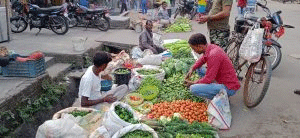Bihar’s vegetable production has been experiencing a notable decline, affecting the local market and pushing up prices due to increased dependence on imports. According to recent data, the total vegetable production in Bihar decreased from 17.84 million tons in 2021-22 to 16.35 million tons in the following year, marking a reduction of approximately 1.49 million tons. The area under vegetable cultivation also contracted from 911,100 hectares to 889,900 hectares during the same period.
Potato cultivation in Bihar has seen an increase in area from 326,600 hectares in 2021-22 to 327,700 hectares the following year. However, production has declined, from 9.04 million tons to 8.78 million tons. Conversely, onion cultivation area has reduced slightly from 58,300 hectares to 57,700 hectares, with production also falling from 1.33 million tons to 1.32 million tons.
Tomato cultivation remained relatively stable, with a slight increase in production from 1.16 million tons to 1.17 million tons despite a marginal increase in cultivation area. In contrast, the production of cabbage and cauliflower has significantly dropped, with cabbage production falling by 9,000 tons and cauliflower by 30,000 tons compared to the previous year. The production of bitter gourd has stagnated at 91,000 tons over the past two years, while bottle gourd production has decreased by 3,000 tons. Eggplant production saw a modest increase of 11,000 tons from the previous year.
The reduction in local production has led to an increase in the import of vegetables, including potatoes from Bengal and onions from Maharashtra. This heightened dependence on external sources has resulted in higher vegetable prices within Bihar, creating an imbalance in the local market.
The decline in production across various vegetables highlights a pressing issue for Bihar’s agricultural sector. The need for improved cultivation practices, better crop management, and enhanced support for local farmers is crucial to stabilize vegetable prices and ensure food security in the state.
Bihar’s vegetable production is on a downward trend, resulting in increased imports and higher prices. Addressing this decline requires focused efforts on enhancing agricultural practices and supporting local farmers to reduce dependency on external sources and stabilize the market.






























